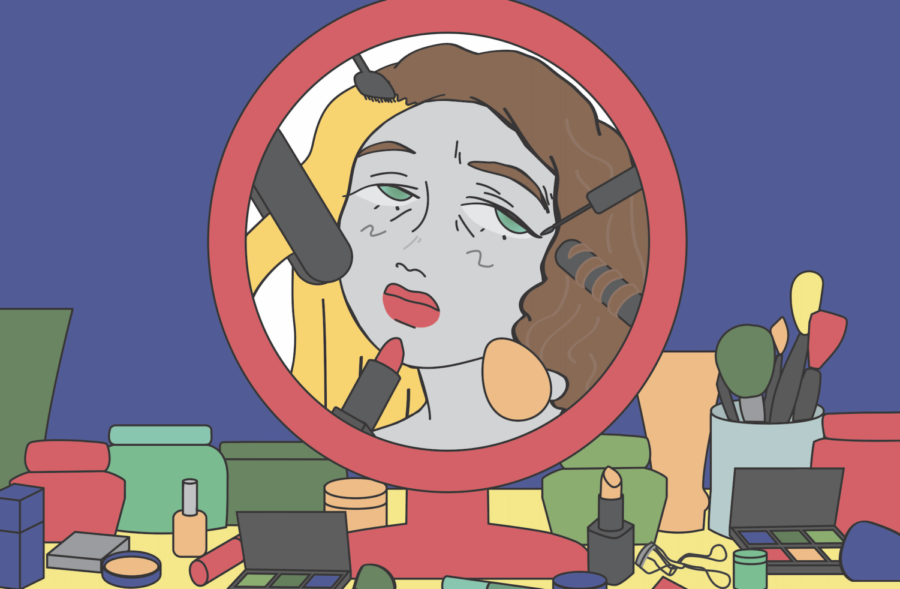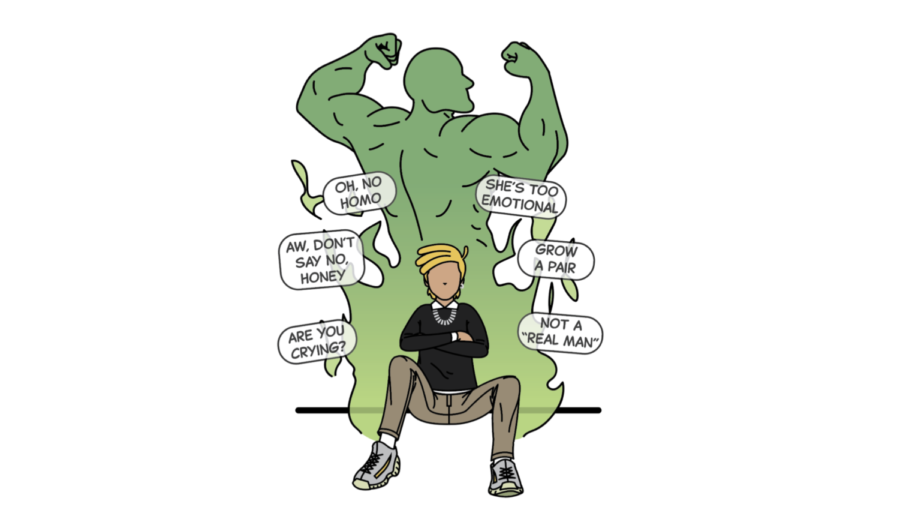The cultural and societal pressures placed on men have created harmful and damaging effects to their body image and self-esteem. The standards of “manliness” and anti-femininity glorify unhealthy habits. From the encouragement of pushing their physical limits to public shaming for participating in certain activities that are traditionally feminine, boys are pressured into portraying themselves as tough — conforming to the expectations of masculinity. Toxic masculinity is a cultural concept that glorifies strength and dominance, forcing men to meet a strict expectation of manliness.
In most major male sports, athletes are encouraged to push themselves to inhuman limits. These athletes and celebrities set an unrealistic expectation for men, the same way that the media has portrayed an unrealistic expectation for women to aspire to. While women are typically fed the idea that they need to diet and adopt eating disorders, men are fed the idea that they need to push themselves to unhealthy athletic extremes to fit the description of a man.
The conditioning of males to appear tough and traditionally masculine hinders boys from feeling comfortable enough to share their feelings publicly. Suppressing emotions can cause them to manifest into acts of violence and self harm. According to the American Psychology Association, these aggressive acts can lead to bullying, the development of misogynistic attitudes, academic challenges and even substance abuse. Men who subscribe to this culture are also more likely to commit violent crimes and are at the highest risk of being a victim to a violent crime.
This mold of masculinity that boys are forced to fit into is suffocating and outdated, yet society continues to place impossible pressures on their physical and mental capabilities. The idea that expressing emotions is a feminine trait is deeply rooted in the insecurity of older generations of men. Expectations of manliness are instilled at a young age. The phrases “grow a pair,” “man up” and “that’s gay” teach boys that emotions are a portrayal of femininity and that femininity is inferior. We have taught boys that they must be tough and strong, while forcing women to represent themselves as weak and small in order to satisfy this image of a masculine man. But these phrases are commonly used around our campus.
Comments like these are one of the most damaging aspects of toxic masculinity. Men will use their heterosexuality as a defense mechanism in order to protect their “manliness.” To be straight is to be a man, right? We see this attitude in athletes who play sports like football and baseball — which embody toxic masculinity. These sports encourage aggression and toughness, especially football. But most importantly, it’s guys who participate in these “manly” activities that tend to use anti-gay slurs the most. They label these conversations of homophobia as “locker room” talk to justify their lack of awareness.
Toxic masculinity encourages men to seek power and dominance. The emphasis on dominance is also dramaticized in sexual and emotional relationships, creating dangerous habits and misogynistic views of women. This notion of control cultivated by toxic masculinity forces women to become more submissive to men. Men who continue to adopt the toxic philosophies of the past tend to view women and relationships in a negative and unhealthy way. The communication and emotional maturity that contributes to healthy relationships has not been taught to men who subscribe to these ideas. This creates the misogynistic view that women are meant to be seen as objects in a relationship and as someone to dominate, rather than as an equal or someone to simply enjoy life with.
As society moves forward and becomes more accepting of all sexualitites as well as lifestyles and fluidity, it’s jarring for older generations to see young males become more secure in themselves and attempt to push out of the ingrained mold of masculinity. These ideologies are based in insecurity and are frankly exhausting. The fear older generations have of being seen as feminine or homosexual contributes to the root of the problem. For centuries, homophobia has been normalized. Internalized homophobia and toxic masculinity tend to go hand in hand, as both are rooted in insecurity and societal pressures. Musicians such as Prince, David Bowie, Elton John and Kurt Cobain began to pave the way for nonbinary clothing as early as the ‘70s, opening up the conversation about gender norms in clothing as well as fashion. Today, popular male identifying artists and celebrities such as Kid Cudi, Lil Nas X, Harry Styles and many others have adopted a new norm of masculinity. This movement did not go without criticism, and many described men in skirts and various other traditionally feminine attire in derogatory terms. The idea of a man in a skirt seems to threaten some men’s ideas of masculinity, causing them to be insecure in themselves and their own sexuality.
This manifests in hateful and destructive opinions. It’s time to change the conversation.
But despite this, alumni Alex Rutter and Edwin Hammerland as well as former student Sam Pozen went against the hateful and negative stereotypes about men and femininity by posing in dresses for Viking day in 2019. There was tons of positive and amazing feedback for their stance on femininity, but yet homophobic comments continued to be passed around. Confidence doesn’t have to be considered “fruity”. Femininity is constantly viewed as a forbidden attitude for men to adopt, but itIt’s time to change the conversation.
It’s a mental battlefield for men to navigate with little to no emphasis on healthy outlets for mental and emotional support. The pursuit of treatment for mental health by men is miniscule. The expectation of strength prevents men from feeling comfortable enough to reach out for proper guidance. Beyond social stigma, toxic masculinity has forced men to suppress their emotions — which unfortunately has real implications. We must change the conversation and discuss these negative issues early. We have to teach boys that they do not need to suppress their emotions in order to be seen as a man. Stripping them of their innocence and vulnerability will only cause a colossal amount of emotional damage.
By encouraging and opening access to mental health services for boys specifically, we can change the way they view themselves and their masculinity. Offering ways for men to deal with anger would prevent them from bottling up their emotions and unleashing it on others. From support groups to one-on-one counseling, these outlets are judgment free and open to those in need. These boys deserve a safe space to discuss their emotions and struggles, especially in such a hostile environment both in and outside of school. Encouraging compassion and kindness towards men and their bodies is the first step to eliminating toxic behavior. Dismantling the idea that masculinity is strictly what it was decades ago prevents the continuation of such a toxic culture. Boys are allowed the freedom to break through the social norms, create their own perception of masculinity and show off their feminine side without judgment. Addressing the negative impacts of toxic masculinity and having these uncomfortable conversations is essential in re-shaping the way we define masculinity.
The influence of toxic masculinity can be dangerous and should be treated seriously. If you or someone you know is experiencing suicidal thoughts, Northshore School District’s Safe Schools Program or call the National Suicidde Prevention Lifeline at 1-800-273-8255.























